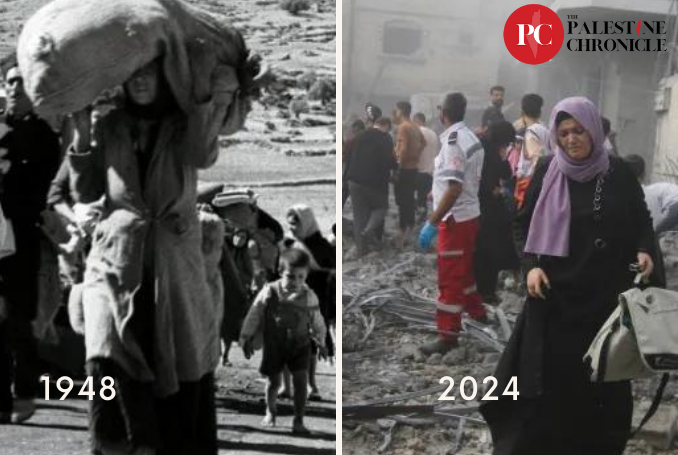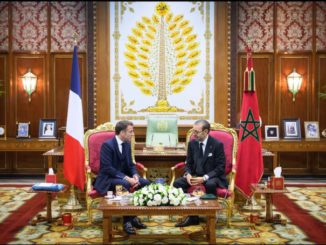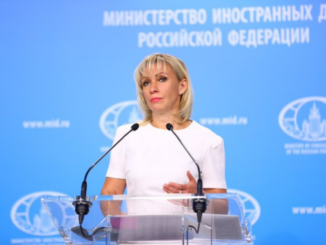
On Wednesday, May 15, Palestinians around the world are marking the 76th anniversary of the Nakba of 1948.
What is the Nakba?
Nakba Day is commemorated every year on May 15.
It marks the destruction of the Palestinian homeland – historic Palestine – and the mass ethnic cleansing of the Palestinian population in 1948.
May 15 has been designated as Nakba day despite the fact that the ethnic cleansing of the Palestinian people from their historic homeland had begun much earlier and on stages.
It started in earnest in late 1947 and continued until 1949.
The process of ethnic cleansing, however, never stopped. It often took place incrementally – what is referred to as incremental genocide – or through wholesale violence, as was the case during and following the June 1967 war, known as the Naksa.
The word ‘Nakba’ itself means ‘catastrophe’ in Arabic and is the term used by Palestinians historians and others to refer to this historic moment.
Today marks the anniversary of the Nakba, when 750,000 Palestinians were expelled from their homes.
The Nakba didn't end in 1948. It is an ongoing campaign of ethnic cleansing, violence and occupation.
Our solidarity lives on – we will never give up on the Palestinian people. pic.twitter.com/S1elsw5XD2
— Jeremy Corbyn (@jeremycorbyn) May 15, 2024
What happened in 1948?
Between 1947-1949 , a mass displacement occurred in which over 750,000 Palestinians were forcibly expelled from their homes by Zionist militias.
Some historians put the number to be higher than 800,000. In any case, the mass expulsion of the Palestinian population has reached 80 percent of all native Palestinians living in historic Palestine at the time.
Throughout this period, Israeli forces destroyed over 530 Palestinian villages and carried out many massacres, resulting in approximately 15,000 deaths.
They included the Deir Yassin Massacre, Tantura Massacre, Beit Daras Massacre among others.
How do you speak about a pain so deep and growing, as if it was a mere political issue, a "conflict" between two sides, with purportedly "competing" narratives? Is genocide a narrative? Is the quest for freedom a conflict? #nakba #Gaza_Genicide
— Ramzy Baroud (@RamzyBaroud) May 15, 2024
As a result of the Nakba, Israel captured 78 percent of historic Palestine, using the newly captured territory to establish the state of Israel.
The remaining land of the once cohesive entity of historic Palestine was divided into what is now the Occupied West Bank and Gaza Strip.
Following these events, homes of Palestinians who were forced out of their homes were given to Jewish settlers.
Many descendants of the Palestinians who were expelled in 1948 remain refugees to this day. Millions of them are divided between internal displacement or are living in the shatat – Diaspora.
There are now nearly six million Palestinian refugees, most of whom are still living in their original refugee camps.
Palestinians in the 1948-occupied territory march to the sites of the pre-1948 villages of Hawsha and Kasyer marking the 76th anniversary of the ongoing Palestinian Nakba, today. pic.twitter.com/vj8F10rnhz
— Quds News Network (@QudsNen) May 14, 2024
Al-Nakba Al-Mustamirra
After 76 years since the original Nakba, Israel has continued to build illegal Jewish settlements on Palestinian territory, displacing families and violating international law.
The Nakba, the catastrophe of dispossession, continues to this day.
The ongoing Israeli genocide in Gaza has been often compared to the Nakba.
Over 35,000 people were killed and millions displaced, including Palestinian refugees who were forced to Gaza after the Nakba or their descendants.
This historic restoration of Palestinian hope for freedom is owed largely to their collective sumud and resistance. Without them, the Nakba would have begun and ended according to the Zionist Israeli script. #nakba #Gaza_will_never_die_
— Ramzy Baroud (@RamzyBaroud) May 15, 2024
What Palestinian scholars said about the Nakba?
“The Palestinian Nakba (catastrophe, holocaust) has no equal in modern history. A foreign minority expels the majority of the inhabitants of a country, occupies their land, obliterates their physical and cultural landmarks in a military campaign that is planned, armed, manned, and is financially and politically supported from abroad.” – Dr. Salman Abu Sitta, Palestinian historian and the founder and President of Palestine Land Society in London.
“For me, the Nakba of 1948, has meant 75 years of dislocation in place, in culture, in ways of life” – Dr. Ghada Karmi, Palestinian author.
“This historic restoration of Palestinian hope for freedom is owed largely to their collective sumud and resistance. Without them, the Nakba would have begun and ended according to the Zionist Israeli script. But the Nakba is now ours. We own it, not only as an experience of shared, collective pain, but as a reclamation of a long-denied justice.” – Dr. Ramzy Baroud, Palestinian author and editor of The Palestine Chronicle.
ISRAEL HAYOM (citing Former Defense Minister Avigdor Lieberman):
The Netanyahu government has no vision and no plan on how to manage operations.Hamas and Sinwar are managing the war from the tunnels better than Netanyahu.
FOLLOW OUR LIVE BLOG https://t.co/kGofq6YBHL a pic.twitter.com/Lgx9nlRRwK
— The Palestine Chronicle (@PalestineChron) May 15, 2024
(The Palestine Chronicle)








